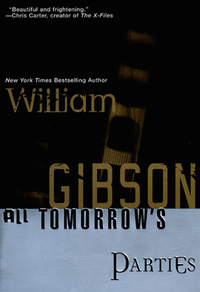 I’m an inveterate William Gibson fan. Neuromancer is one of my favorite books of all time and Burning Chrome is an incredible short story. Yeah there were a couple of slipups (I’m looking at you Difference Engine), but the body of work as a whole resonates with me.
I’m an inveterate William Gibson fan. Neuromancer is one of my favorite books of all time and Burning Chrome is an incredible short story. Yeah there were a couple of slipups (I’m looking at you Difference Engine), but the body of work as a whole resonates with me.
What grabs me the most is the “techno-cultural ether” he manages to generate. A Gibson book never stops to explain a technology. The characters all treat the fancy stuff as if it was air, the way we do laptops, and cell phones, and WI-FI, and X-Boxes, etc., etc. The focus on the cultural milieu, as opposed to hard science, often makes Gibson’s works seem light and airy to some folks. That in my book is just the residue of elegance.
I’ve heard, the “Virtual Light” series receive this criticism, but upon rereading the books, some distance gives the trilogy some more heft.
All Tomorrow’s Parties, the culmination of the trilogy, was definitely better than I remembered. In typical Gibson fashion, a number of parallel threads interweave and interlock their way to a dramatic conclusion. Bobby Rydell, ace rent-a-cop from Virtual Light, reenters the scene as well as Chevette, his bicycling love interest. The echoes of Idoru ripple around the Pacific Rim, through to cyberspace and back.
Parties works best as an ode to the organic life of unplanned urban environments. One of the major dramatic tensions is the survival of the autonomous community that has enveloped the remnants of the Bay Bridge. More than once this odd confluence of people, cultures, and scraps of technology conspire to save Rydell and Chevette.
The book is not without its flaws though. A few too many new characters are added to the mix, some with stage time disproportionate to their dramatic impact. The infosphere conflict between Colin Laney and Harwood is muddled and confusing. Parsing through Laney’s past and his final battle left me cold.
But as I said I have a soft spot for Gibson so I can’t really discourage anyone from reading All Tomorrow’s Parties.